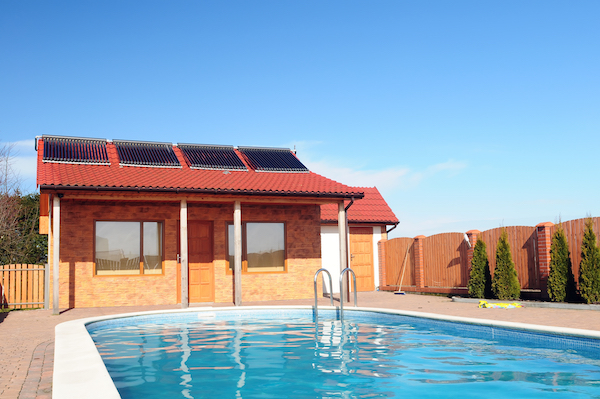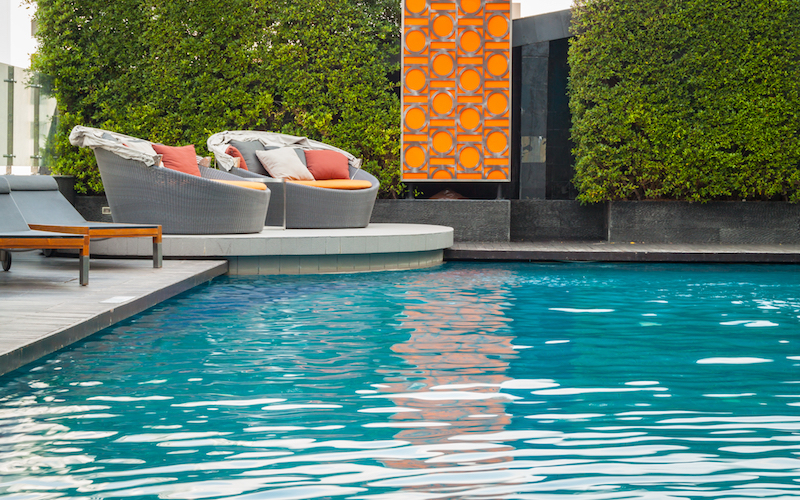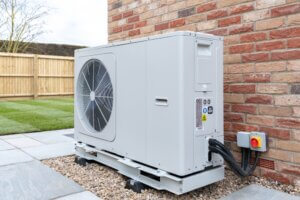While most homeowners focus on the positives when thinking about having a pool in their backyard, you have to remember the extra costs that come along with all the pleasures the pool has to offer. Heating your pool, while not necessary, extends the time of use for your pool and makes it more enjoyable during those cloudy days. With a variety of pool heaters on the market, it is important to understand the difference between them to ensure that you are installing the one that best fits your pool and your budget.
Selecting the right heater for your pool will make certain that there is no wasted energy that will result in wasted costs. Depending on the size, structure, and location of your pool, one heater is going to be more suitable than the others. The main pool heaters on the market are natural gas/ propane heaters, heat pumps, electrical heaters, and solar heaters.
The average cost of each heater is determined through a number of factors. For example, the type of heater you install, the installation fees for the heater, and the yearly costs associated with running the heater. Varying from place to place and product to product, it’s always best to consult a pro for a quote.
Types of Pool Heaters
Heat Pumps
Heat pumps are energy-efficient electric heaters. They function by transferring heat from the environment into the pool versus generating heat themselves. The energy required to transfer the heat is higher versus a gas heater, however, they use a relatively low amount of electricity which will cut costs on your energy bill. The high cost of installation is outweighed by the low operating cost. Unfortunately, these heaters are not ideal for all environments as they require temperatures of ten degrees celsius or higher to perform efficiently. This makes heat pumps a bad option for Canadian pools.
Natural Gas and Propane Heaters
Natural gas heaters have the ability to heat your pool at the flick of a switch. Being one of the most reliable heaters, they are faster and cheaper than electric or solar heaters. No matter what time of day, your pool can be heated to the perfect temperature. On the downside, these heaters are not as environmentally friendly and have a high installation cost because you need to hire a gasfitter to hook it up to an existing gas line.
There are two kinds of natural gas heaters to consider. Millivolt uses a burning pilot which is constantly running and therefore expends more gas. With an electronic ignition, the more modern of the two, the process is more efficient due to the fact that the switch can be turned on/off therefore not using gas that is not needed. Electronic ignitions do require an electrical connection, unlike a burning pilot. These heaters are ideal for heating larger pools on a more consistent basis. Natural gas heaters are cheaper than electric or solar panels upfront, however, the costs to keep them running are relatively high.
Solar Heaters

Solar heaters use the sunlight to heat your pool. Great for the environment, and your wallet, these heaters are not for all pools and function well for small pools in an area that receives a lot of sunlight. Solar heaters and panels are simple to install and can be installed almost anywhere (outside roofs, off decks, beside your pool, on the ground). Essentially a one time cost, the unit and the installation, but then you can heat your pool for free for the rest of its lifespan.
While this heater may seem like a no brainer with no operating costs and great for the environment, unfortunately, they are not ideal in all locations and for all pools. There is a high initial cost and the heating process is slower and relies on mother nature to perform at its best. If you live in a cloudy climate, solar heaters might not be your best option.
Electrical Heaters
Electrical heaters use electricity to heat the water. These heaters are not ideal for larger pools and are commonly used to heat spas, hot tubs, or small pools. There is a low initial cost, they are easy to install, and the repair costs are also low. The downside is that the running costs are very high, which is why they are used to heat smaller pools. The heating time is also slow as compared to the other methods.
With so many factors impacting the functionality of the pool heater, familiarizing yourself with the heaters available and weighing the pros and the cons will give you an idea of what heater is best for your pool. Additionally, consulting a pro to take a look at your pool and the associated environment will help you best determine what heater you should get.

